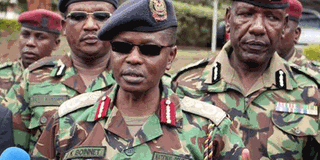Why the police must protect Kenyan lives

Inspector-General of Police Joseph Boinett addresses the media at General Service Unit headquarters on September 20, 2016. The Independent Medico Legal Unit (IMLU) has consistently shown that torture and extrajudicial killings are on the rise. PHOTO | DENNIS ONSONGO | NATION MEDIA GROUP
What you need to know:
- Police Service spokesman George Kinoti categorically dismissed the report and questioned whether “Haki Africa supports the Kenyan people or terrorist groups”.
- It would appear that, like in the West, the so-called ‘war on terror’ is just a license for illegal detentions, disappearances and killings.
Do Kenyan lives matter? Apparently not, judging by the Police Service response to Haki Africa’s recent report on killings and disappearances in the Coast region.
The Mombasa-based human rights organisation’s 46 page report gave names, dates and details of 57 killings and 24 disappearances since 2012.
Haki Africa demanded that the police investigate each killing and disappearance but, according to the Police Service statement, they have absolutely no intention of going down that road.
Police Service spokesman George Kinoti categorically dismissed the report and questioned whether “Haki Africa supports the Kenyan people or terrorist groups”.
A stark if very misleading choice. Of course, he promised a more detailed response later on but going by past performances, we should not expect any further dispatch from Vigilance House.
The report showed how most victims were youth, and all of them Muslim.
Some were high profile killings and others not known beyond their villages.
Haki Africa pointed the finger at the Anti-Terror Police Unit (ATPU) as being responsible for most killings and disappearances and claimed that the unit has been trained by British and American security forces.
KILLINGS ON THE RISE
It would appear that, like in the West, the so-called ‘war on terror’ is just a license for illegal detentions, disappearances and killings.
The rule of law has been abandoned and no explanations given.
Haki Africa questions the silence of the state, the refusal to investigate and the ‘shoot-to-kill’ policy of all sections of the police service.
Extrajudicial killings have become so common that they rarely make the headlines unless of course they are high profile like lawyer Willy Kimani.
The Independent Medico Legal Unit (IMLU) has consistently shown that torture and extrajudicial killings are on the rise.
In their recent National Torture Prevalence Survey, they revealed that 38 per cent of all Kenyans have experienced torture at the hands of Kenyan Police.
The anti-torture organisation documented 534 extrajudicial killings between 2013 and 2015.
In the first four months of 2016, a further 65 were shot dead by officers hired to protect them.
The total figure for the year will almost certainly reach 200.
As in the Haki Africa case, these are just the documented cases. The actual figures are probably much higher. But who cares?
Civil society organisations do care and will not relent in exerting pressure on the government to account for the slaughter of its own citizens.
The Haki Africa report was entitled ‘What do we tell the Families?’ and that is the question that human rights organisations are asking of their government.
Where are the disappeared? Who killed the others? When will they ever get justice?
SEEKING JUSTICE
The matter is so grave that both Amnesty International and Human Rights Watch have called for the establishment of a Commission of Inquiry into extrajudicial killings and disappearances, both past and current.
Such a commission would allow Kenyans an opportunity to know what is behind the killings.
It would complement the work of the Independent Police Oversight Authority (Ipoa) and, perhaps, revive the stalled police reform agenda.
In any case, the police and Internal Security Ministry cannot go on forever denying Haki Africa, Muhuri and IMLU reports while the graves increase.
[email protected] @GabrielDolan1




